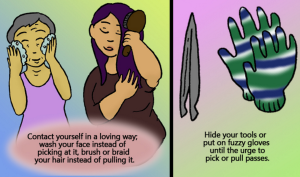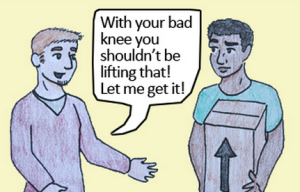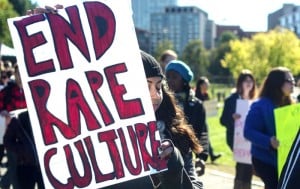Friendship.
It’s a word that’s supposed to have positive connotations, right?
The word reminds me of lovely things – things like feeling supported, feeling loved, doing exciting things and making happy memories with people I adore.
I would hope that friendship would evoke a similar joy for everyone.
But if I tell one of my male friends – especially a friend that might have expressed romantic or sexual interest in me – that he’s my best friend, some people seem to view my friendly feelings as a bad thing.
Or when female leads on my favorite TV shows emphasize how much they value their friendships with their male friends, viewers tend not to believe them, eagerly waiting for them to return the male lead’s affections.
Why is it that a word that’s supposed to signify a beautiful, special relationship has a undesirable connotation?
Why does pop culture have such a strange, negative reaction to non-romantic, non-sexual friendships at the moment?
Being considered someone’s friend should be thought of as an honor, yet it isn’t. It’s crucial that we unpack the way popular culture is influencing how we think about friendship.
I’m referring to the ‘friendzone’, an idea which is ubiquitous these days. It seems that one can’t go for a few hours on the internet without reading or hearing about it. It’s become a popular trope, the basis of a number of jokes and memes and a nearly universally-recognized concept.
The thing is that the idea of the friendzone is rooted in a number of oppressive assumptions.
You see, we’re all socialized to believe a number of things about relationships and sexuality. And a lot of those things are both incorrect and harmful.
In many ways, the idea of the friendzone perpetuates some of those ideas. For this reason, it’s incredibly important that we think about the idea of the friendzone critically.
Let’s try to unpack some of the oppressive myths that uphold the idea of the friendzone!
Myth #1: Nice Men Deserve to Be with The Women They Desire
A key problem with the idea of the friendzone is sexual entitlement – the idea that certain people deserve sex.
The idea of the friendzone is as follows: person A (usually a man) is interested romantically and sexually in person B (usually a woman). Person B, however, sees person A as a friend and isn’t interested in them in a romantic or sexual sense.
Being ‘in the friendzone’ is when someone views you as a friend, such that they will never view you as a potential romantic and/or sexual partner.
A lot of the discourse surrounding the idea of the friendzone places the man as the ‘friendzoned’ and the woman as the ‘friendzoner’. In other words, the man is the one who desires the woman and the woman is the one who rejects the man.
(Because of cissexism and heterosexism, of course, non-binary people and same-gender couples are often left out of the trope.)
Often, the discourse on the friendzone shames women for ‘friendzoning’ men who are nice to them.
Because if you’re a good person and you want to sleep with, or date someone, you should be able to do so – right?
Well, no.
What about the other person in that situation? What about what they want?
Why are they shamed for their desire to remain friends while the other person’s desire to pursue a relationship generates empathy? Being decent to someone should be expected.
We shouldn’t expect to get rewarded with sex or a romantic commitment simply for being a decent human being.
The thing is that we’re socialized to view women as trophies we reward to men for good behavior. Think about the plot outline of most male-centric movies: when the male character overcomes the central conflict, and proves himself to be a good, heroic person, he ends up with his female love interest.
As a result, we think of ‘nice’ men as deserving of a woman’s time, love and affection. This has the effect of insinuating that men are entitled to certain things from women, and women are awful for rejecting men.
Underplaying female desire is the other side of perpetuating male sexual entitlement.
Why is it that we don’t often sympathize with women who feel like they’ve been ‘friendzoned’ by men? Is it because we don’t feel that women are entitled to sex and romantic relationships simply for being ‘nice’?
Or is it because we buy into the stereotype that men are always the pursuers and women are always pursued?
Ultimately, the idea of the ‘friendzone’ upholds the idea that men deserve women, which objectifies women. Additionally, it shames women for making their own decisions regarding their sexual and romantic relationships.
Myth #2: Everyone Is Heterosexual
I have a really close male friend who I love and appreciate dearly. A few years ago, a couple of our friends teased us, saying that we were a textbook example of the ‘friendzone’ in action.
To us, our friendship is a comforting, happy, healthy relationship. We support and care for one another deeply. But to others, our friendship was a case of me being a total bitch towards my friend.
In reality, neither of us wanted a committed romantic relationship with one another. But because of the common idea of the friendzone, people simply assumed that my male friend wanted a sexual and romantic relationship with me.
Something our friends didn’t know at the time was that he’s asexual – he experiences very little, if any, sexual attraction to people. He did not have the capacity to be sexually attracted to me, even though our friends assumed he did.
The idea of the friendzone sometimes manifests in queer communities. But an overwhelming amount of the discourse surrounding the ‘friendzone’ is based in heterosexist assumptions.
Heterosexism is the idea that heterosexuality is the normal, superior, or only valid sexual orientation. Heterosexism ultimately oppresses people who are not heterosexual.
The idea of the friendzone is usually imposed on friendships between men and women. The problem with this is that we assume that they both have the capacity to be interested in one another’s gender.
My experience is not the only instance in which heterosexism can be perpetuated by the idea of the friendzone. What if we’re assuming that a woman is friendzoning a male friend, but in reality, she’s lesbian? Or perhaps aromantic or asexual?
Of course, men can be attracted to women without being heterosexual, and vice versa – people can be attracted to many genders at once! – but still, the root of this assumption is heterosexism. This is because it’s based in the idea that heterosexuality is the norm.
When we assume that people are heterosexual unless they tell us otherwise, we uphold the idea that heterosexuality is the standard sexual orientation, and all other orientations are deviating from the norm. This perpetuates the idea that other sexual orientations are abnormal.
The idea of the friendzone often makes underlying assumptions about what people desire, thus marginalizing people who don’t conform to those assumptions.
Myth #3: Friendships and Other Platonic Relationships Are Inferior to Romantic Relationships
The idea of the friendzone implies that being friends with someone is inferior to dating or sleeping with someone. It implies that friendship is punishment, or at least, that it’s not as desirable as a romantic and/or sexual relationship.
Our society has a tendency to value romantic and sexual relationships – particularly between married people – above all other relationships. This is why we’re socialized to undervalue friendship.
But this hierarchy of relationships is a damaging social construct. In reality, our friends can sometimes be the most important people in our lives – more important than our partners and sometimes even family members.
This is pretty sad, because friendship can be such a beautiful thing – it can be a source of support, growth and love. To a great number of people, being friends with someone is not a rejection, but an honor.
Sometimes people truly do want to be ‘just’ friends, not because they’re rejecting their friend’s romantic advances, but because they value their friendship as it is. When we apply the idea of the friendzone to those relationships, we end up undervaluing the importance of friendship.
Myth #4: All Relationships Have Clearly-Defined Boundaries That Cannot Change
When say people are ‘friendzoned’ it communicates the idea that they can’t escape being seen in a certain light. In other words, it implies that relationships don’t change – that once you are viewed as a platonic friend, you can’t be viewed as a potential partner.
Well, that’s bullshit.
Friendship can be platonic. That much is true. And sometimes, friendships remain friendships for lifetimes and they never change.
But friendship doesn’t inherently prevent different relationships from developing further along the line. In fact, I’d argue that friendship is the best basis for romantic and sexual relationships.
The thing is that there is no ‘zone’. Relationships shouldn’t have clearly-defined boundaries set by society. Relationships transform and change because people and circumstances transform and change.
When it comes to relationships, boundaries should be set by the people who are in them – not by the society around them. Because of this, boundaries are fluid and subject to change.
This might be harsh, but if someone isn’t attracted to you, it’s not always because you became their friend first. It could be because they’re simply not attracted to you.
Myth #5: If You’re In Love with Someone Who Doesn’t Return Your Affections, You Will Be Unhappy
Of course, the friendzone isn’t always about entitlement.
For sure, there are people out there who are genuinely in love with people who don’t want to be anything other than friends with them. I’ve definitely been in that situation before.
In this situation, though, we shouldn’t dismiss our relationship as being ‘in the friendzone’. Our hurt doesn’t justify holding onto a concept that unintentionally devalues our friendships and disregards our friends’ autonomy.
Here’s the thing:
You can have romantic feelings for your friend and still maintain a fulfilling, healthy friendship.
You can have romantic feelings for your friend and still respect their feelings and boundaries.
You can have romantic feelings for your friend and still be happy being their friend.
If we dwell too much on the concept of the friendzone and allow heteronormative and entitled thinking to define our relationship, we risk missing out on a potentially wonderful friendship.
***
The fact that so many people buy into the idea of the ‘friendzone’ is testament to the fact that these myths are deeply ingrained into our society. For this reason, it’s important that we think carefully and critically about the concept.
If you ask me, it’s time we ditch the concept of the friendzone for good.
[do_widget id=’text-101′]
Sian Ferguson is a Contributing Writer at Everyday Feminism and a queer, polyamorous, South African feminist who is currently studying towards a Bachelor of Arts majoring in English and Anthropology. Originally from Cape Town, she now studies at Rhodes University in Grahamstown, where she works as vice-chair of the Gender Action Project. She has featured as a guest writer on websites such asWomen24 and Foxy Box, while also writing for her personal blog. Follow her on Twitter @sianfergs. Read her articles here.
Search our 3000+ articles!
Read our articles about:
Our online racial justice training
Used by hundreds of universities, non-profits, and businesses.
Click to learn more





















